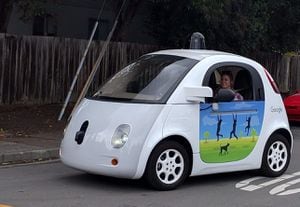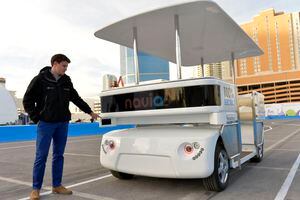Mark Andrews: Driverless cars? It's time to take back control
Should the schools open all at once, or should there be a phased return? What about shops and the pubs? When will Boris get his Barnet tamed?

While listening to the same old debates about how and when life should return to normal after the lockdown, it occurred to me that there was one group that has been consistently overlooked over the past 11 months. Teenagers unable to learn how to drive.
Tens of thousands of kids will have turned 17 over the past year, and most will have been forced to delay a huge milestone in life that most of us have taken for granted.
Sure, it's terrible that children have missed out on their education, and there is no easy answer to how they are going to make up for the lost months. But call me a cynic, I'm always sceptical when I hear teenagers saying how much they miss school.
My school days were riddled with interruptions. First, it was coal shortages round about the Winter of Discontent, which they solved by telling us to keep our coats on, and wheeling in some kind of paraffin heater that stank the place out.
A few years later, it was the teachers turn to go on strike, and they always seemed to be on strike about something or other. During one of the strikes we were expected to turn up for registration, go straight home because the maths teacher was on strike, and then come back an hour-and-a-half later for double French. And if you didn't come back, the headmaster wrote a letter to your parents about your non-attendance. Which seemed a bit rich at the time.
But let's be honest, I loved it. While it might not have been good for my education, I would be lying if I said I was unduly upset about missing out on a few sessions of sines, cosines and tangents. After all, whoever heard of a teenager that wanted to go to school?
Yet while missing a few classes didn't bother me too much, I'm sure I would have been distraught at not being able to learn how to drive.
I think I was counting the days to my driving test from the moment I got my Matchbox Mini while still in a pushchair. And I will never forget the sense of euphoria and liberation when I passed my test.
My first car, a bright red Renault 5, was another waymarker along life's journey. At the age of 19, I finally owned something substantial, and felt I now had a stake in the world. I was a participant in life's big adventures, not a spectator.

And yet figures show that even before the pandemic, the number of youngsters experiencing the joys of learning to drive have been in decline for some time. Thirty years ago, 48 per cent of those aged 17-20 held a full driving licence, but by 2019, this had fallen to 35 per cent. This will partly be down to the fact that the process takes much longer these days, with the theory exam, hazard perception test and what not, whereas back in the 80s you could book a five-day residential course and bin your L-plates within a week.
But anecdotal evidence also suggests this is only part of the story.
I remember reading a quote a few years ago, where a young girl explained why she had no interest in owning a car. "You can't use your iPhone when you're driving," was given as the reason. I must admit it shocked me a little. While I spent my teenage years hankering after an MG Midget, it seems today's youngsters are far more interested in having the latest XBox or mobile. The allure of the open road has bypassed a generation which had become accustomed to sitting at the back of the bus tapping at a keypad.
And then we come to driverless cars. The Transport Secretary says they could come to the UK this year, they're already being tested in Las Vegas, and Apple says it plans to launch its own model in 2024. And for a dyed-in-the-wool petrolhead, it is hard to think of anything more dispiriting than the thought of a driverless car being developed by a dreary computer giant.
It's not as if we haven't been here before. You might remember the Sinclair C5, a strange contraption developed by a computer company as the solution to our transport needs. An ugly lump of white plastic powered by a washing machine motor, for some reason it never caught on. And when you look at the pictures of some of these driverless cars, you can see that they are hewn from the same DNA.
I fear that 20, maybe 30 years from now, the car as we know it will be on the verge of extinction, replaced by driverless pods that people will book on their smartphones, before punching their addresses into the sat-nav and sitting back to play with their phone. And it's not the sort of future that fills me with any great cheer.
Because for people like myself, the car is not just a form of transport, it's deeply embedded into modern culture: think Bodie's silver Capri in The Professionals, the bronze Ford Consul in The Sweeney, the General Lee in the Dukes of Hazzard. Even Del Boy's three-wheel van has a place in our hearts. Could you imagine James Bond chasing after the villains in a pre-programmed, autonomous pod? Could you imagine Motown music emerging from the Silicon Valley?
I never did get the MG, that's a story for another day. But the various motors I have owned, from the little red Renault through to the lumbering grey Rolls-Royce I have had for the past 14 years, have all been a huge part of my life. I look back at the pleasure they have given me, the memories they hold, and feel sad that future youngsters will miss out on all that.
And if all tomorrow's kids have to look forward to is the daily routine of calling an autonomous electric pod on their iPhone, I fear they will miss out on far more than a few days away from the classroom.
Driverless cars? No thanks, not for me. It's time to take back control.





